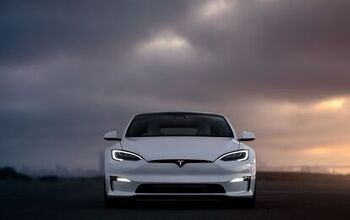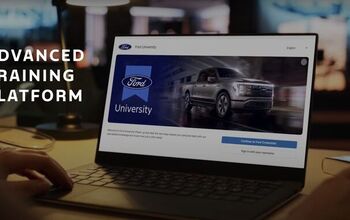Natural Gas is Behind the Nation's Largest Heavy-Duty Electric Truck Charging Station

A new heavy-duty electric truck charging station is opening near the ports of Long Beach and Los Angeles in southern California, but the electricity powering it isn’t as new-age as the vehicles it charges. Though capable of charging up to 96 trucks at a time, the station is backed by natural gas, which is cleaner than dozens of trucks burning diesel but not the green solution many had probably hoped for.
The two companies behind the effort, Performance Team (Maersk) and Prologis, have said the station would eventually become hydrogen-powered, removing the fossil fuel element from the equation, but Electrek reported that there is no timeline in place for that conversion. Solar isn’t an option because there isn’t enough real estate for the panels.
Despite its old-school fuel-burning power source, the charging station will work during power outages, keeping logistics flowing out of some of America’s busiest ports. Electric big rigs are still a rarity on our roads today, but their number will grow as more players jump into the game.
It’s hard to knock the charging station too much, but it would be nice to know when the hydrogen changeover will happen. Diesel semi-trucks are loud, and a fleet of electric trucks could remove thousands of tons of carbon and diesel particulates from the air each year. The charging station located near major port access could play a significant role in that effort, as the shorter-range, “last-mile” logistics would be a perfect use case for electrification.
[Image: ADLC via Shutterstock]
Become a TTAC insider. Get the latest news, features, TTAC takes, and everything else that gets to the truth about cars first by subscribing to our newsletter.

Chris grew up in, under, and around cars, but took the long way around to becoming an automotive writer. After a career in technology consulting and a trip through business school, Chris began writing about the automotive industry as a way to reconnect with his passion and get behind the wheel of a new car every week. He focuses on taking complex industry stories and making them digestible by any reader. Just don’t expect him to stay away from high-mileage Porsches.
More by Chris Teague

































Comments
Join the conversation
"... would eventually become hydrogen-powered, removing the fossil fuel element from the equation," And pray tell how is the hydrogen going to be generated?
Natural gas was considered clean energy until it was discovered to be cheap and abundant. You probably have no business insulting the intelligence of others if you couldn't figure that out on your own.
A few mega packs would probably have served as decent backup.
Serious question: so the PRK's power generation mostly comes from natural gas but only 70% is produced internally with 30% imported from other states. What happens if the other states either blockade the use of their power/gas or closer to an Enron scenario jack up the prices in some ridiculous way due to Sacramento's bullying nature?